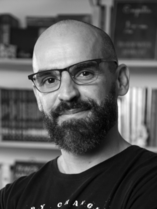Contact
André Felipe Cândido da Silva is a researcher in the history of science, medicine, and environment at Casa de Oswaldo Cruz in Rio de Janeiro, a center devoted to research, teaching, documentation, and communication in the history of health and science. He is also a professor for the Graduate Program for History of Science and Health at the same institution.
André’s research interests lie at the intersection of history of science, medical, and environmental history and his studies, published in articles and book chapters, comprise the history of the life sciences in twentieth century Brazil, with a particular focus on the knowledge circulation involving Brazil, Germany, and the United States. He also focuses on the history of ecological knowledge derived from medical and agricultural investigations and the relations between health, ecology, and development projects in Brazil in the time period following the Second World War. Silva is currently coordinating a research project on the history of international scientific cooperation on the Amazonia ecology in the Great Acceleration, in which he focuses on a German-Brazilian network devoted to tropical ecology.
RCC Research Project: The Amazon as an Anthropocene Hotspot: Harald Sioli and the German-Brazilian Scientific Cooperation on Amazonian Ecology (1952–2002)
Selected publications:
- “Pragas, patógenos e plantas na história dos sistemas agroecológicos” [Pest crops, pathogens, and plants in the history of agroecological systems]. Boletim do Museu Paraense Emílio Goeldi: Ciências Humanas 17, no. 1 (2022): e20210023. https://doi.org/10.1590/2178-2547-BGOELDI-2021-0023.
- with Gabriel Lopes. “Entre Horizontes e Sedimentos: o Impacto do Antropoceno na História a partir de Chakrabarty e seus Interlocutores” [Between horizons and sediments: The impact of the Anthropocene in history from Chakrabarty and his interlocutors]. Historia Ambiental Latinoamericana Y Caribeña (HALAC) Revista de La Solcha 11, no. 2 (2021): 348–96. http://dx.doi.org/10.32991/2237-2717.2021v11i2.p348-396.
- with Dominichi Miranda de Sá. “Amazônia brasileira, celeiro do mundo: Ciência, agricultura e ecologia no Instituto Agronômico do Norte nos anos 1940 e 1950” [The Brazilian Amazon, the world’s breadbasket: Science, agriculture and ecology at the Agronomic Institute of the North in the 1940s and 1950s]. Revista de História 178 (October 2019): 1–26. https://doi.org/10.11606/issn.2316-9141.rh.2019.145623.
- “German Foreign Cultural Policy and Higher Education in Brazil, 1933–1942”. In Intellectual Collaboration with the Third Reich: Treason or Reason?, edited by Maria Björkman, Peter Lundell, and Sven Widmalm, 182–97. London: Routledge, 2019.
- “Race, Health and Colonial Politics in the Third Reich: Nauck and Giemsa’s Expedition to Espírito Santo, Brazil, 1936.” In WIDMER, A.; LIPPHARDT, V. (Org.). Health and Difference: Rendering Human Variation in Colonial Engagements, edited by Alexandra Widmer and Veronika Lipphardt, 21–43. New York: Berghahn Books, 2016.


